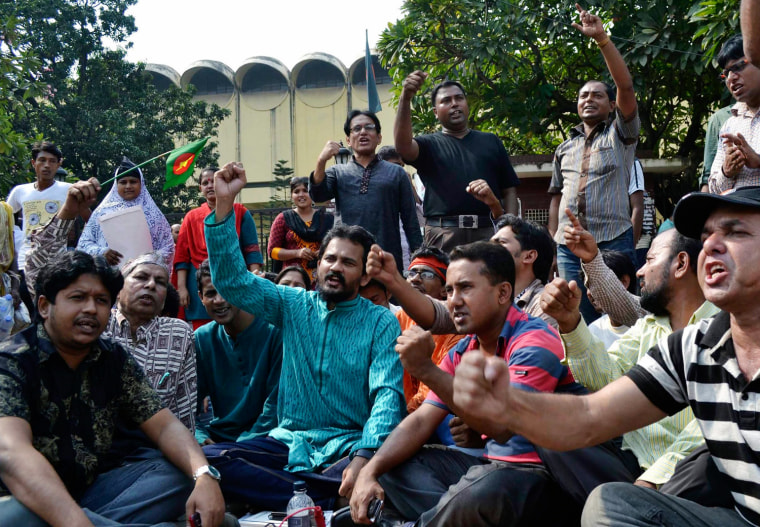DHAKA — A Bangladesh war crimes court convicted and sentenced to death in absentia on Sunday two men accused of committing atrocities during the country's war of independence from Pakistan in 1971.
Britain-based Muslim leader Chowdhury Mueen Uddin and Ashrafuzzaman Khan, a U.S. citizen, were found guilty of the torture and murder of 18 intellectuals during the war, lawyers and tribunal officials said.
They said the 18 included nine Dhaka University teachers, six journalists and three doctors. Both men were 65 years old.
"Justice will be denied if they are not given death sentences for their heinous crimes," judge Obaidul Hassan told the crowded tribunal.
Lawyers representing Mueen denounced the verdict and said the court had staged a show trial.
Bangladesh has been hit in recent months by a wave of violent protests over war crimes convictions, presenting the government with a security and credibility challenge ahead of polls early next year.
The tribunal has brought down eight convictions so far, with six defendants sentenced to death.
Prime Minister Sheikh Hasina set up the tribunal in 2010 to investigate abuses during the conflict, during which India helped Bangladesh, then known as East Pakistan, break away from Pakistan. It delivered its first verdict in January.
The prime minister's opponents say she is using the tribunal against the two biggest opposition parties, the Bangladesh Nationalist Party (BNP) and the Jamaat-e-Islami.
Bloodletting has erupted across the country since the tribunal's first verdict. More than 100 people have been killed in the clashes this year, most of them were Islamist party activists and members of the security forces.
Outside the courtroom, veterans of the war were among hundreds of people who cheered the verdict.
So far, six former and current Jamaat leaders and two BNP leaders have been convicted.
The New York-based Human Rights Watch group has said the tribunal's procedures fall short of international standards.
Rejecting all charges leveled against Mueen, his international legal team said in a statement: "This is coming from a body that has been accused of gross irregularity and misconduct by human rights groups, notable figures and institutions around the world."
It accused the government of staging a "political show trial" to help the ruling party keep power in upcoming elections. It called for a halt to all trials and the convening of a full international inquiry.
INTERNATIONAL STANDARDS UPHELD: MINISTER
Law Minister Shafique Ahmed told reporters that international standards had been upheld and pledged action to bring the two men to Bangladesh.
"We know where they are living. We must do our best to bring them back and execute them," state prosecutor Tureen Afroz told reporters.
Sunday's verdicts appeared to have triggered no unrest.
But sporadic violence broke out on the eve of a new 60-hour strike called by the BNP to demand next year's election take place under a non-partisan government. Several people were injured as crude bombs went off in Dhaka and other cities.
Bangladesh became part of Pakistan at the end of British rule in 1947 but it broke away from Pakistan in 1971 after a nine-month war. Some factions in Bangladesh, including the Jamaat, opposed the break with Pakistan, but the party denies accusations that its leaders committed murder, rape and torture.
About three million people were killed, according to official figures, and thousands of women were raped.
